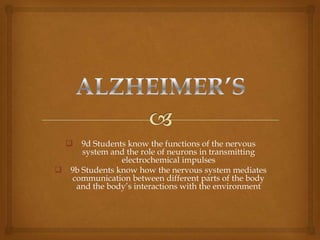
Kiki's project
- 1. 9d Students know the functions of the nervous system and the role of neurons in transmitting electrochemical impulses 9b Students know how the nervous system mediates communication between different parts of the body and the body’s interactions with the environment
- 2. WHAT CAUSES ALZEIMER’S Alzheimer's disease start’s by a bunch of proteins in the brain. Some how scientist say that plaque’s and tangles may be the cause of Alzheimer’s. Alzheimer’s disease occurs when neurons get damaged in parts of the brain and start to die. As neurons die, the brain is left with less neuron’s so its hard to remember new information. So it’s hard to remember existing memories. As the disease goes on more neurons die. So they lose their ability to understand and interact with other people.
- 3. WHY DOES ALZHEIMER’S HAPPEN WHEN YOUR OLD Alzheimer’s disease mostly occurs when someone reaches an advancing age or somewhere around age 70. It does it have to be around age 70 it could happen anytime. Cause of a large amount of the brain’s neurons are already dead or are dying from the disease. The process may accelerate as the person ages. Due to the brain’s decreasing ability to defend itself against insults.
- 4. WHY DO PEOPLE GET ALZHEIMER’S People that have parent’s or sibling that developed Alzheimer's disease are likely to develop it as well. Scientists say that there’s two kinds of gene that are passed by family members.. The first gene is APOE-e4, that increases the chance of developing Alzheimer's. Scientist say there are more risk genes not discovered. The second gene is deterministic gene and it’s different than risk genes. Deterministic genes are only found in a few families. This gene increases the chances of getting it on a early age.
- 5. HISTORY OF ALZHEIMERS In 1901 a German psychiatrist Alois Alzheimer identified the first case of what became known as Alzheimer's. A fifty year old woman he called her Auguste D had Alzheimer's. she died in 1906 cause of the disease. It was first described as a distinctive disease by Emil Kraepelin. For most of the 20th century, the diagnosis of Alzheimer's disease was reserved for individuals between the ages of 45 and 65 who developed symptoms of dementia. It led to the diagnosis of Alzheimer's disease independently of age . The term senile dementia which is (SDAT) was used for those over 65, with low Alzheimer's disease being used for those younger.
- 6. WAY’S TO PREVENT ALZHEIMER’S You can prevent Alzheimer’s disease and other dementias by eating right, exercising, staying mentally and socially active, and keeping stress in check. According to scientific research physical exercising reduces your risk of developing Alzheimer’s disease by 50 percent. Also reading can prevent you from having Alzheimer's.
- 7. What happens during it Neurons begin to work less probably because a abnormal protein begin to accumulate, forming tangles. Neurons begin to lose their ability to communicate. As it progresses and the damage spreads further in the brain, the person enters a stage referred to as moderate Alzheimer's disease. The brain continues to shrink and symptoms become more serious as the disease reaches the areas of the cerebral cortex that control language, reasoning, sensory processing, and conscious thought. A person with moderate AD may wander or become confused, anxious or engaging in angry outbursts, tearfulness, or restlessness. His attention span may shorten. He may have problems recognizing family and friends, and difficulty with language, reading, writing and use of inappropriate undressing or the use of vulgar language.
- 8. WHY DO SOME PEOPLE GET ALZHEIMER AND SOME DONT The first reason why other people just don’t get is because it does it run on their family. While other’s do. Some individuals are able to resist the onset of Alzheimer’s. What this people are resilient against is the toxic buildup in the brain of a fibrous protein called amyloid. This material is made by cells throughout the body, throughout one's life, largely to no effect— until a certain point.
- 9. SYMPTOMS OF ALZHEIMERS The mood and personalities of people with Alzheimer's can change. They can become confused, suspicious, depressed, fearful or anxious A person with Alzheimer's may start to remove themselves from hobbies such as social activities, work projects or sports. Or remembering how to complete a favorite hobby. People with Alzheimer's may have trouble joining a conversation. They may stop in the middle of a conversation and have no idea how to continue or they may repeat stuff they already said before or start talking about his past.
- 10. HOW DO PEOPLE DIE FROM IT Alzheimer's patients forget how to eat. Some forget how to swallow. So when they eat they might start choking. Or food just goes down the wrong pipe, Some forget how the breath and they die with out no one wondering So typical complications of Alzheimer's are heart attacks, thromboembolisms, strokes, kidney failure, and lung infections due to aspiration of food.
- 11. HOW DOES THIS IMPACT THE WORLD Well I think this impacts our community cause many people die of Alzheimer's. Also it impact their family and friends. Alzheimer’s is a sad disease because you for get your family members and don’t remember the good times you spent with your friends or family. It’s also a painful death.
- 12. Citing’s http://en.wikipedia.org/wiki/Alzheimer's_disease http://www.prevention.com/alzheimers/index.sht ml This is the only site I used so I can get my information